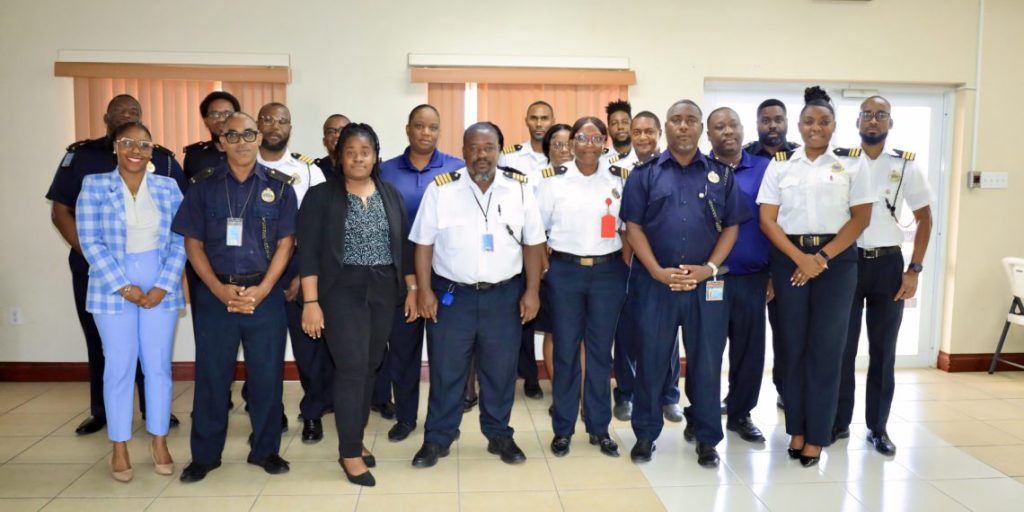Training on the Single-Use Plastics (SUP) Ban Conducted by the Department of Environment
The Federation of St. Kitts and Nevis has embarked on a significant journey towards environmental sustainability by implementing a ban on single-use plastics (SUPs). This initiative, announced by Hon. Dr. Joyelle Clarke, Minister of Sustainable Development, Environment, Climate Action, and Constituency Empowerment, reflects the government’s commitment to reducing plastic waste and promoting environmental conservation. The ban is structured in three phases, targeting various SUPs throughout 2025, demonstrating a systematic approach to addressing the pervasive issue of plastic pollution. To ensure the effective enforcement of this crucial regulation, the Department of Environment conducted a vital training workshop for the Customs and Excise Unit, the frontline personnel responsible for monitoring and regulating the import and flow of goods within the Federation.
The workshop, titled “Understanding the SUP Ban,” was held at the Customs and Excise Unit’s facility and provided a comprehensive overview of the ban’s intricacies. It aimed to equip customs officers with the knowledge and tools necessary to identify prohibited SUPs, understand allowed exemptions, and ensure compliance with the established regulations. This training initiative highlights the government’s recognition of the importance of inter-agency collaboration in achieving its environmental goals. By empowering customs officers with the necessary skills and information, the government is laying the groundwork for successful implementation of the ban.
The training session brought together senior officers from the Customs and Excise Unit and representatives from the Department of Environment, fostering a collaborative environment for learning and information sharing. Experts from the Department of Environment led the sessions, focusing on critical aspects of the SUP ban. They provided detailed information on the types of plastics covered by the ban, outlining specific examples and characteristics to aid in accurate identification. The training also addressed the complexities of exemptions, ensuring officers could differentiate between permissible and prohibited SUPs based on specific criteria. This nuanced understanding of the ban’s provisions is crucial for effective enforcement.
Furthermore, the workshop addressed practical enforcement strategies, equipping officers with the tools and techniques to monitor and control the import and distribution of SUPs. Discussions included effective inspection procedures, documentation requirements, and strategies for handling potential violations. Emphasis was placed on collaborative best practices, promoting communication and coordination between the Customs and Excise Unit and the Department of Environment. This collaborative approach strengthens the overall enforcement mechanism and ensures a cohesive response to potential challenges.
The training also highlighted the importance of clear communication and public awareness in achieving the ban’s objectives. By fostering a shared understanding of the ban’s rationale and implementation, the government aims to encourage public compliance and minimize potential resistance. The collaborative efforts of the Customs and Excise Unit and the Department of Environment are crucial for effectively regulating the flow of SUPs into the Federation and ensuring adherence to the new regulations. This partnership strengthens the overall enforcement framework and contributes to the successful implementation of the ban.
In essence, the “Understanding the SUP Ban” workshop served as a crucial stepping stone in the Federation’s journey towards a more sustainable future. By equipping the Customs and Excise Unit with the necessary knowledge and resources, the government has demonstrated its commitment to effectively implementing the SUP ban and achieving its environmental goals. The collaborative approach, focusing on inter-agency cooperation and public awareness, underscores the importance of collective action in addressing the global challenge of plastic pollution. The training embodies the government’s proactive stance on environmental protection and its dedication to creating a cleaner, healthier environment for present and future generations in St. Kitts and Nevis. This proactive approach, coupled with ongoing monitoring and evaluation, is crucial for ensuring the long-term success of the SUP ban and achieving a meaningful reduction in plastic waste within the Federation.
Share this content:








Post Comment